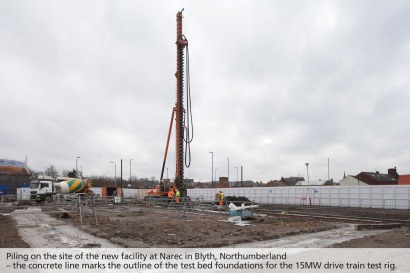
To provide sufficient support for the wind turbine drive train test rig, a 43-metre by 12-metre test bed foundation will be constructed to a depth of 4 metres. This will be contained within a 32-metre high steel framed building constructed with 1300 tonnes of steel. The access door is 20 metres x 20 metres and 2 x 250 tonne cranes will lift test pieces into place.
Tony Quinn, Director of Major Projects and Assets at Narec, said: “It’s great to see works starting on site for this world-leading facility, which will accelerate technology development and time to market for the UK offshore wind industry. It will provide Narec with a controlled environment to test the next generation of offshore turbines in accordance with international standards, before they are deployed in large numbers offshore. ”
The Energy Technologies Institute (ETI) is investing £25 million in the Narec facility, by providing funding to GE Energy - Power Conversion and MTS Systems Corporation for the design, development and commissioning of the test rig.
“The test rig that will be housed on the Narec site is the biggest project to date commissioned by the ETI and has seen us invest over £25m in its design, development and commissioning. It will be a world leading large-scale engineering project and we look forward to the site being developed and taking shape over the next few months,” added Dr David Clarke, ETI Chief Executive.
One North East invested £10 million in the building to house the rig.
Energy Technologies Institute
The Energy Technologies Institute is a UK-based company formed from global industries and the UK Government. The ETI brings together projects and partnerships that create affordable, reliable, clean energy for heat, power, transport and associated infrastructure.
The ETI’s six private sector members are BP, Caterpillar, EDF Energy, E.ON, Rolls-Royce and Shell. The ETI’s public funds are received from the Department for Business Innovation and Skills through the Technology Strategy Board and the Engineering and Physical Sciences Research Council (EPSRC). The ETI will accelerate the deployment of affordable, secure low-carbon energy systems from 2020 to 2050 by demonstrating technologies, developing knowledge, skills and supply-chains and informing the development of regulation, standards and policy.
For additional information:

